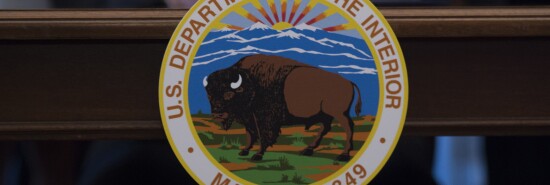
Biden’s climate agenda creates energy poverty in tribal nations
Sen. Steve Daines and Kathleen Sgamma
Video Embed
The White House is hosting its Tribal Nations Summit this week, and it’s important to note that the administration’s climate policy is bankrupting the tribes it claims to help.
The president is sure to promise, as he has at previous summits, that his administration “will defend tribal sovereignty, self-government, and self-determination and will support tribal economies.” Unfortunately, the administration’s policies do the opposite. Specifically, the administration’s energy policy is crushing our nation’s tribes by robbing them of reliable jobs and much-needed revenue — all to please the climate lobby.
BIDEN CONCEDES HE IS ‘NOT SURE’ HE WOULD BE SEEKING REELECTION IF IT WASN’T FOR TRUMP
Not surprisingly, the president’s decisions are plunging many of the country’s Native Americans deeper into poverty and making them more dependent on the federal government. Energy development on tribal lands not only helps decrease America’s dependence on foreign sources of energy but also provides vital income to tribes by creating jobs and making them less dependent on federal handouts. But under this administration, many tribes are being denied these win-win benefits.
Interior Secretary Deb Haaland recently canceled existing oil and gas leases in the National Petroleum Reserve in Alaska and set aside more than 13 million acres that were previously available for energy exploration. She did so without proper consultation with local Native communities and after Congress passed a law authorizing the leases.
The repercussions are jarring. Oil and gas production on tribal lands dropped substantially over the past two years. The Interior Department is also cutting back on future production by cutting drilling permits on tribal lands by 60%. This is devastating for our nation’s tribes.
In testimony before Congress, Nagruk Harcharek, president of the Voice of the Arctic Inupiat, shared his community’s frustration, stating, “When Washington takes action in the Arctic, our people are an afterthought.” He added that Interior’s action “was done without consulting our people.”
The Navajo Nation is experiencing similar economic impacts of the administration’s misguided policies. This summer, Haaland finalized the withdrawal of oil and natural gas leasing surrounding the Chaco Culture National Historical Park in New Mexico. This action alone prevents 5,600 members of the Navajo Nation from developing the oil and natural gas they rightfully and legally own, depriving them of nearly $200 million over 20 years.
In this impoverished area, oil and natural gas royalties can help put food on the table. Many Navajos live in small trailers, some without running water and electricity. The median income is $20,000 a year, and for many, oil and natural gas royalties can bring in an additional $28,000 a year.
It’s little wonder the Navajo Nation Council said Haaland’s decision would cause Navajos to be “pushed into greater poverty.”
The reaction from the Navajo president to the administration’s decision was swift and sharp. “The Secretary’s action undermines our sovereignty and self-determination,” President Buu Nygren said. “Despite my concerns and denunciation, the Department of Interior has move[d] forward, which is highly disappointing. Secretary Haaland’s decision impacts Navajo[s] … but also disregards the tribe’s choice to lease lands for economic development.”
In Oklahoma, the Osage Nation faces the threat of heavier restrictions and higher costs to developing their oil and natural gas resources. The Biden administration sought to place many of the same controls on Osage lands that it has placed on other federal lands, as if they are the same.
Osage Minerals Council Chairman Everett Waller told media this year that permitting slowdowns by the Interior Department harmed his tribal community. “Their checks are going down, but their monthly bills are getting to where they can’t pay them,” Waller said. “It’s a livelihood that they need.”
Tribal production of coal is also under threat, including in Montana, where the Biden administration is delaying much-needed permits and threatening the operations of coal mines throughout the state, including those owned by tribal entities. Coal supports tribal entities such as those on the Crow Reservation. In fact, during Biden’s first two years in office, royalties for tribal coal production were cut in half compared to the previous two administrations. Biden’s support for a ban on coal leasing on federal land and attacks on coal-generated power will further perpetuate the cycle of dependency and poverty for the tribes he promised to empower with sovereignty and self-determination.
CLICK HERE TO READ MORE FROM THE WASHINGTON EXAMINER
Instead of creating jobs, boosting financial well-being, and encouraging energy independence, the Biden administration is more interested in doling out billions in federal dollars to tribes. Over the past two years, Interior distributed $1.9 billion on mostly one-off projects on tribal lands that fail to provide sustainable sources of income. The funds come from the Infrastructure Investment and Jobs Act, the signature piece of “Bidenomics” that has contributed to inflation that already affects those who can least afford it.
The Biden administration is quick to proclaim it is helping historically marginalized communities. Yet, the evidence shows an aggressive effort to stop energy development that enables tribes to pursue the prosperous future they deserve. Regrettably, tribes across the country are once again experiencing the hardships that come from popular rhetoric and extreme policies being pushed by an overreaching federal government.
U.S. Sen. Steve Daines and Kathleen Sgamma, president of the Western Energy Alliance.
